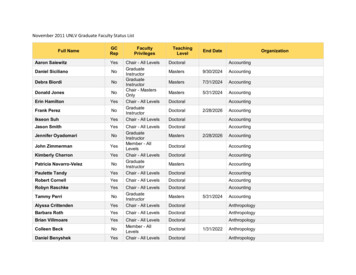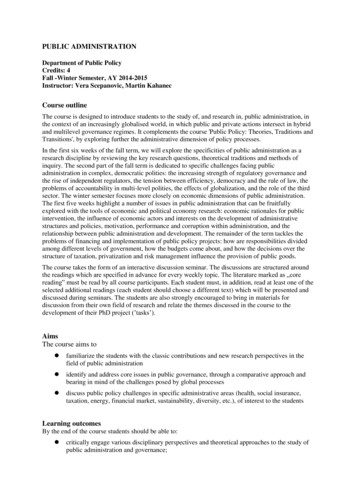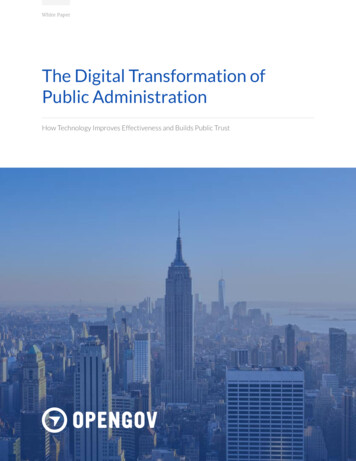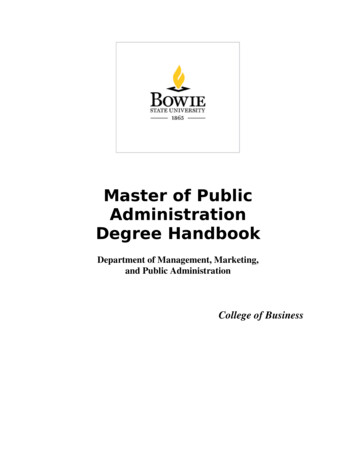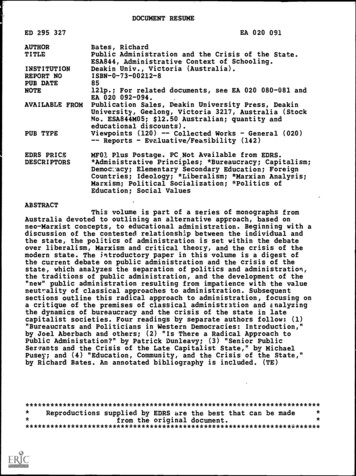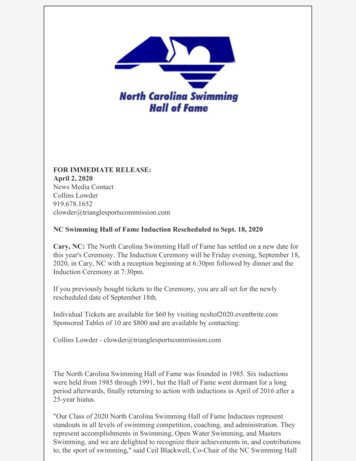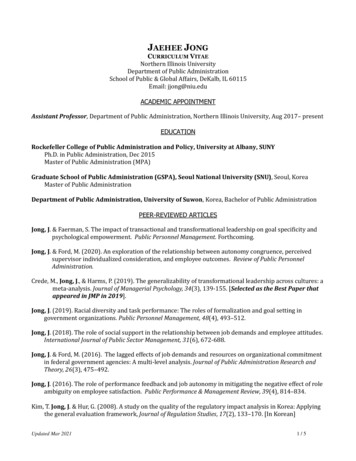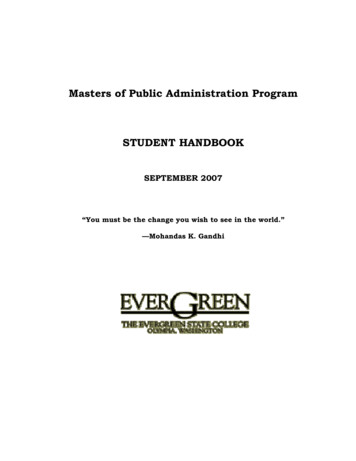
Transcription
Masters of Public Administration ProgramSTUDENT HANDBOOKSEPTEMBER 2007“You must be the change you wish to see in the world.”—Mohandas K. Gandhi
TABLE OF CONTENTSAdministrative Support and Faculty . 3Welcome . 4Who does what at MPA and Where to get Help. 5Provisions and Conditions of Entry . 6Transfer Credits. 6Computers, E-mail and Internet Access . 7MPA Concentrations. 8Student Academic Pathway Worksheet . 9Joint MPA/MES Degree . 10Core, Required, Concentration and Elective Courses . 10Contracts . 11Individual Learning Contracts . 11Internships . 11Capstone. 13Thesis Projects . 14Human Subjects Review . 15Academic Advising. 15Registration . 16Evaluations. 16Graduation. 17Financial Aid. 18MPA Student Union. 20Students with Disabilities . 20Academic Honesty . 21Credit Policy, Academic Standing, and Incompletes . 21Leaves Of Absence . 21Grievance Procedures . 22Academic Appeals . 22Non-Discrimination Policy . 22Sexual Harassment Policy. 23Inclement Weather Class Cancellation Policy. 23Student Conduct Code . 23Social Contract and College Philosophy . 24Administrative Office Relocation Guide . 27Campus Map . Back Cover2
MPA PROGRAMADMINISTRATIVE SUPPORT & FACULTY2007-08Cheryl Simrell KingDirector & FacultyMike McCanna,Assistant Director - TribalRandee Gibbons,Assistant DirectorMary reen.edu360.486.4665mary@marycampbell.orgKaren Champagnie Almanalmank@evergreen.eduVictor Colman360.956.9344cathyvic@comcast.netDick Cushing360.754.1405dccushing@comcast.netAnn Daley360.357.9439daley52@comcast.netBruce Davies360.867.6398daviesb@evergreen.eduStuart Elway206.264.1500hstuart@elwayresearch.comKaren Fraser360.786.7642Karenfraser22@comcast.netColleen ey.comAmy Gould360.867.6135goulda@evergreen.eduBill Hagensbhagens@net-venture.comGail Johnson360.786.1246gail.johnson1@comcast.netTina Kuckkahn360.867.5344kuckkaht@evergreen.eduCherie Lucas Jennings360.867.6782cheri@evergreen.eduRuss LehmanRusslehman@qwest.netT. S. (Steve) e McGee360.705.1233mcgees@evergreen.eduHelena el Mucha360.753.8362mmucha@ci.olympia.wa.usAlan Parker360.867.5075parkeral@evergreen.eduNita Rinehart360.867.6129rinehar@evergreen.eduEdmund B. Ruttledge360.584.9339ed.ruttledge@comcast.netLarry el Shadow206.624.2080shadowassociates@qwest.netDavid A. Tetta206.553.1327dtetta@comcast.netFaith Trimble360.754.1954flt@fltconsulting.comJeanne Ward360.459.7591jmward@zhonka.net3
THE EVERGREEN STATE COLLEGEMASTER OF PUBLIC ADMINISTRATION PROGRAMWelcomeCongratulations on your enrollment in Evergreen’s Master of Public Administration program. Theprogram staff and faculty look forward to working with you and helping you realize your academicand professional goals. We hope you find the program challenging and rewarding.This Student Handbook has been prepared as a guide to the policies and operational details of theMPA program and as a complement to our catalogue and website. Use it to answer your questionsabout our program. If you need more information or have questions, visit the Website(www.evergreen.edu/mpa) or contact one of us. The Assistant Directors’ main job is to servestudents and either Randee Gibbons or Mike McCanna can help you answer your questions.Welcome to the program!Cheryl Simrell KingDirector and Member of the FacultyOur MissionOur students, faculty and staff create learning communities to explore and implement socially just,democratic public service. We think critically and creatively; communicate effectively; work collaboratively; embrace diversity; value fairness and equity; advocate powerfully on behalf of the public; and imagine new possibilities and accomplish positive change in our workplaces and in ourcommunities.Our PhilosophyEvergreen's MPA program provides an intellectual, collaborative and engaged learning environmentin which students learn to act as facilitators in defining and pursuing the public interest. Key ideasand concepts are presented within the historical, political, social, cultural and economic context ofpublic administration.Students develop expertise in both oral and written communication. Much of the work takes place inseminars, small group discussions where participants discover the meaning or significance ofassigned readings. Students experience teamwork while working to complete various learningprojects. They learn to reason critically, to analyze important dimensions of public service and tounderstand and take coherent positions on key public administration and policy issues. In addition,students have opportunities to discuss contemporary public issues with practitioners and faculty anduse their own experiences to integrate theory and practice.4
Who does what at MPA/Where to go to get HelpAssistant MPA Directors: Randee Gibbons (General Cohort)Mike McCanna (Tribal Cohort)Guide: goal is to teach students to navigate EvergreenMPA program and procedure questionsInfo & referral when you don’t know where to goHelp to overcome obstacles and intercede when necessaryCourse enrollment managementDegree requirements: “where am I in my program?”Internship informationGraduate program scholarshipsGraduation processManaging communications (website, newsletter, listserves, etc.)Writing Assistant Help with assignments at any and all stages (generating ideas, creating an outline,proofreading, grammar, how to do citations, etc.)Faculty Course related questions: syllabus, assignments, textbooks, due dates, incompletes, etc. Sponsor Independent Learning Contracts, Internship Learning Contracts and ThesesFirst Year Core Faculty: Cheryl King, Russ Lehman, Nita Rinehart Course related questions: syllabus, assignments, textbooks, due dates, incompletes, etc. Sponsor Independent Learning Contracts, Internship Learning Contracts and Theses Academic advisingAcademic Program Support staff: Ruth Joynes, Pat Kolstad Student evaluation processingMPA Director: Cheryl King Overall administration of MPA Policy/procedure final decision maker Approving transfer credits Approving internships Approving graduation requests5
PROVISIONS AND CONDITIONS OF ADMISSIONAdmission to the Master of Public Administration program (MPA) is based upon demonstration of asound academic and/or professional history, coupled with community involvement and theAdmission Committee’s belief in the candidate’s potential for academic success. Candidates may beadmitted provisionally or conditionally if they have not met all of the admission requirements.Students are accountable for satisfying those requirements, as specified in their letter of admissionand within the specified time limits.Provisional AdmissionStudents who are admitted provisionally with the requirement that they complete an undergraduatedegree prior to entering their first Core program must order an official transcript from the degreegranting institution immediately upon completion of the degree. At a minimum, the AdmissionsOffice must receive written confirmation of the degree from an official at the awardinginstitution by September 15 before the student may enroll for Fall Quarter. Official transcripts,due no later than November 1 (September 15 for financial aid funds to be released for Fall Quarter),should be submitted to the Admissions Office.Conditional Admission and Completion of Program PrerequisitesStudents who are admitted conditionally are notified of the terms of their admission in theiradmission letter. Documentation that the conditions have been satisfied, such as official transcriptsof courses taken, should be sent to the Admissions Office as soon as possible after the completion ofthe work. Program prerequisites must be completed before a student will be allowed to enrollin the second year Core courses.TRANSFER CREDITSThe MPA program may accept up to 20 graduate credit hours earned within the past ten years ataccredited institutions. A grade of “B” or better must have been received for such courses to beconsidered for transfer. Students wishing to transfer credits earned for course work completed priorto their MPA enrollment should notify the MPA Director before the first quarter of graduate studiesat Evergreen. Students must submit, to the MPA Director, paper copies of transcripts and syllabifrom courses for which transfer credit is requested. Transfer credit will be granted based on anumber of factors, including the correspondence between courses completed elsewhere and MPAcoursework offered at TESC. Students wishing to transfer credit earned elsewhere while enrolled inthe MPA program should consult with the MPA Director before enrolling in such courses. The MPADirector awards transfer credit, following review of appropriate materials, including transcripts andcourse syllabi.Official transcripts must be submitted to the Admissions Office before any transfer credit can beawarded.Credit will not be granted for life and/or work experience, nor for graduate credit earned throughextension, correspondence work, or continuing education.6
COMPUTERS, E-MAIL, AND INTERNET ACCESSAn Evergreen e-mail account is required for all MPA students as it is our primary form ofcommunication. These accounts are automatically created at the time of admission. You may needto activate this account. To activate yours and access your mailbox, go tohttps://my.evergreen.edu/selfserve/logon.aspx. Click on “Need help logging in?” Follow thedirections on the next page under “Logging in for the first time?” Once you're logged in, click onthe link for “View my email via the web.” You may need to log in again there using the sameusername and password. That will take you to your messages.MPA students are automatically added to a program-wide Internet mailing list (or “listserv”) calledmpa-all, and a list for their specific cohort (mpa2007, mpa-tribal2006, etc.) These lists are used topost announcements of class assignments, schedule and course changes, news, events, resources,volunteer opportunities, questions and requests for help, and more. It isn’t required for students toremain on these lists, but we strongly encourage it, since the information they contain may beimportant to you. Students should check for new messages at least two to three times a week.In addition, the MPA program operates other lists that students can join, including mpa-jobs (whichlists job and internship openings with government and nonprofit organizations in the region), mpaalumni, and mpa-studentunion. To join any of these listservs follow directions located at thefollowing web index.php?title MyEvergreen Account Summary InfoStudents have access to Macintosh and Windows computers, with Internet access and a variety ofup-to-date software, in the campus Computer Center on the second floor of the Library building.The Computer Center also offers a variety of free classes and workshops on many softwareapplications. The Graduate Student Lounge in the Graduate Studies Office (Lab I 3023) also hascomputers for student use.7
MPA CONCENTRATIONSThe work that people do in the public service is vast. To meet this need, the MPA program offers three areasof concentration so students can tailor their learning to meet their particular requirements. The concentrationsoffered by the program are:Public and Non-profit AdministrationStudents in this concentration will prepare for, oradvance in, careers as administrators in public ornonprofit organizations. Coursework covers thecritical elements of administration—budgeting,strategic planning, human resources and informationsystems, public law, leadership and ethics,multicultural competencies, and more—as well asthe unique nature and needs of nonprofit andgovernment organizations.Degree Requirements for Public and Nonprofit Administration Concentration1st and 2nd Year Core*ElectivesCapstoneTotal Credits24 credits32 credits4 credits60 creditsPublic PolicyStudents in this concentration will prepare for, oradvance in, positions as policy analysts, budgetanalysts, or evaluators. Students in thisconcentration will complete two Public PolicyConcentration courses (Foundations of Public Policyand Advanced Research Methods), plus one or moreelective courses in specific policy areas. Electivecourses will be offered in areas such as healthpolicy, poverty policy, education policy,environmental policy, energy policy, and possiblyothers. Students with an interest in other policy areasmay study them through individual learningcontracts with MPA faculty.Tribal GovernanceThe goal of this concentration is to developadministrators who can assist both tribalgovernments and the public agencies with which thetribes interact. Students in the Tribal Concentrationgo through the entire program as a cohort and finish intwo years. Students take a Core course and aConcentration course each quarter. Courses aretaught in an intensive format, meeting four weekendsessions each quarter (two sessions for Core courseand two sessions for the Concentration course). Eachsession is 20 hours long and meets Friday afternoonsand all day on Saturday and Sunday.Students in this concentration complete a series offive 4-credit courses focusing on issues of criticalimportance to tribes. Other MPA students can enrollin these Tribal Concentration courses as electives ona space-available basis.8Degree Requirements forPublic Policy Concentration1st and 2nd Year Core*Foundations of PublicPolicyAdvanced ResearchMethodsElectivesCapstoneTotal Credits24 credits4 credits4 credits24 credits4 credits60 creditsDegree Requirements forTribal Governance Concentration1st and 2nd Year Core*Tribal ConcentrationsElectivesCapstoneTotal Credits26 credits20 credits10 credits4 credits60 credits*Pre-requisite Note: Before students areallowed to register for the second year corecourses, they must complete a 4 credit“Introduction to Statistics” course and aminimum of 4 credits of “Economics” whichincludes both macro and micro-economics. Thestudent must earn a minimum grade of “C” inthese courses. Credit for these courses musthave been earned within the previous five years.
MPA - Student WorksheetGeneral (Non-tribal) CohortName :Student Number:Begin Program:Anticipated Graduation:MPA Core CoursesFirst Year Core (12 credits)TitleFoundations of Public AdministrationDoing Public AdministrationDoing DemocracySecond Year Core (12 credits)TitleAnalytical Techniques for Public ServiceAnalytical Techniques for Public ServiceAnalytical Techniques for Public ServiceQuarter CompletedCredits(Fall)(Winter)(Spring)444Quarter CompletedCredits(Fall)(Winter)(Spring)444Choose Concentration:Public and Non-Profit Administration (32 elective credits required)*Public Policy (24 elective credits required the two required courses listed below)*Foundations of Public PolicyAdvanced Research Methods(Fall)(Winter)44Quarter CompletedTotal Grand TotalMust Equal at Least60* Electives include Independent Learning Contracts (ILC, up to 12 credit hours) and Internship (up to 4 credit hours).Electives are either 2 credit (short courses) or 4 credit hour offerings.**Students must complete a minimum of 45 credits before taking capstone.Students from either concentration may choose to do an 8 credit Thesis in lieu of the Capstone.Students taking this option extend the Thesis over two quarters and take four fewer elective credits.10
JOINT MES/MPA DEGREEThe Master in Environmental Studies and Master in Public Administration programs at TheEvergreen State College offer a combined MES/MPA degree. This joint program is designed bothfor environmental professionals who wish to improve their administrative skills, and for publicadministrators who want to gain expertise in the analysis of environmental issues.Students must complete a total of 96 credits to obtain the degree. This includes Core coursework inboth programs, electives, plus an 8 or 16 credit MES Thesis. Students may choose either the MES orMPA quantitative methods/research design programs in the MES or MPA Core. If a studentemphasizes Public Policy in the MPA program, s/he must take the MPA Advanced ResearchMethods course. If a student is in the MPA Tribal Governance Concentration, s/he must take the fiveMPA Tribal Concentration courses. Electives should be divided approximately equally betweenMES and MPA, and the MPA and MES Directors must approve the plan for electives/thesis.Applicants seeking admission to the combined MES/MPA degree program should complete theMaster of Environmental Studies application and indicate their interest in the joint degree. For moreinformation on the application process, contact the MES Assistant Director, JT Austin, at (360) 8676225 or austinj@evergreen.edu.CORE, REQUIRED AND ELECTIVE COURSESCompletion of 1st and 2nd year Core programs is a requirement of the MPA Program, for allconcentrations. No portion of the Core requirement can be waived even if there appears to be someredundancy with the student’s previous work.If a student receives no credit for a Core program and/or withdraws from a program beforecompletion, that student must re-register and complete that Core class (the next year). Only underexceptional circumstances, and at the approval of the Director, can a Core program be completed asIndependent Learning Contract.Be sure to check whaich classes are required for your concentration: Tribal Governance studentstake a series of five required concentration classes; Policy Concentration students are required totake Policy Foundations and Advanced Research Methods.Concentration and required courses are open to students in other concentrations as electives on aspace available basis.Students select from the wide range of electives offered each term. Every attempt is made to rotateelective offerings (no guarantees) so students have an opportunity to take a wide variety of coursesand to build their own specialties. However, be aware that those students who plan to complete theprogram in 2 years will have fewer options than those students who take a bit longer to completetheir degree.10
CONTRACTSContracts are a means by which students can meet individual needs not otherwise addressed withinthe regular curriculum. Some students are required to perform a credit generating internship beforethey can graduate, while others may choose to perform an internship contract or an individuallearning contract to pursue experience and/or knowledge not available through the normal coursework.A student registering for a contract and internship in the same quarter with the same instructor mustmerge the two activities into one graduate internship contract. The Registration Office will notallow one faculty member to sponsor more than one contract per quarter with the same student.MPA students may apply a maximum of 12 credit hours of graduate contracts(combination ofinternships and individual learning contracts) toward their degree.Students may complete an 8 credit thesis project as a graduate individual learning contract in lieu ofthe Capstone seminar and four credits of electives.Individual Learning ContractsWhen a student’s academic program design cannot be satisfactorily completed through the availableelective courses and internships, the student may arrange a Graduate Individual Learning Contractwith a faculty member. This is a negotiated, signed agreement between the student and faculty forthe student to pursue independent, individualized study. In most cases, due to limitations of facultytime, the burden of the academic design and undertaking is on the student, with the faculty primarilyassisting as a guide and mentor. It is the faculty’s responsibility to ensure that sufficient work isassigned for the number of credit hours desired. Students who believe they will need and benefitfrom a Graduate Individual Learning Contract should consult their faculty and the MPA Director foradvice on the appropriateness of such an undertaking and for suggested faculty sponsors. Thisshould occur several weeks prior to the beginning of the quarter in which the contract is to occur.The Graduate Individual Learning Contract form is available on the MPA website athttp://www.evergreen.edu/mpa/forms. The final contract document is signed by the student and thefaculty sponsor and must be approved by the MPA Director before the student registers.No more than 12 hours of Graduate Contract credit can be counted towards the MPA degree.InternshipThe MPA program at Evergreen admits applicants with varying levels and types of professionalexperience. Some applicants may need to expand their public sector work experience in order tobetter understand the field, and to be more competitive candidates for future jobs. If an applicant hasnot done at least a year’s worth of full-time work with significant responsibility in public or nonprofit administration or in a public policy area, then the applicant will be required to complete aninternship before graduating from the program. This internship is minimally one quarter credit hourand involves part-time work with an agency or organization in the public or non-profit sector for onequarter. The admissions committee will determine whether an applicant is required to do an11
internship, and will include this requirement in the letter of admission. Internship credit will counttoward the MPA degree as part of a student’s elective credits.An internship is a learning experience designed to aid students in achieving specific academic andprofessional objectives. Although some MPA students are required to complete an internship, allstudents are strongly encouraged to include an internship in their educational plan, especially if theydo not have prior professional-level experience in the public administration area of interest to them.It is important that students have an opportunity to become oriented to the MPA program beforeundertaking an internship. A student must complete two quarters in the MPA program beforedeveloping a credit-generating internship.Internships are generally with government agencies or nonprofit organizations. If you areconsidering an internship, you should initiate discussions with your faculty. In doing so, you willassess the type of internship in which you are interested (credit generating or non-credit generating,paid or voluntary, type of agency or organization involved), the extent to which you will benefitfrom an internship, and how it fits into your overall academic plan.Two internship options are available to MPA students1. A credit-generating internship is one in which the student, faculty sponsor, andagency/organization supervisor formally agree upon a student’s academic objectives for thequarter and develop a plan for achieving those objectives in a workplace setting. It must includenew academic learning and not be developed only to obtain work experience or entry-levelemployment. Occasionally, a student may be allowed to undertake a credit-generating internshipwith the agency at which she/he is employed. Evergreen has strict policies for these internships:a student who wishes to do an employment-related internship must work with the MPA Directorearly in the planning process to ensure that the credit being sought is for a project that is not apart of his/her regular work.2. In addition, many organizations advertise entry-level internships throughout the year. These donot include formal academic components or earn academic credit. While it is important todiscuss such internship opportunities with an advisor, taking an internship that does not includeacademic credit is ultimately an individual arrangement between the student and the internshipagency or organization and does not require the formal procedures or forms described below.Locating an InternshipAfter you have determined that an internship is appropriate for your academic plan, and if you do notyet have a specific internship in mind, check with the Assistant Director for leads and ideas.Internship opportunities are often posted via e-mail on the mpa-jobs listserv.The Washington State Legislature sponsors several graduate interns each summer. These interestingand well-paid internships are publicized and filled the previous fall because legislative staff personsare unavailable during the legislative session, which meets during the winter and spring. If you areinterested in this type of internship, you may obtain further information through the office of theAssistant Director.12
Internship Learning Contract and RegistrationA credit-generating internship is planned, arranged and conducted to meet the needs of the hostorganization and the academic and professional objectives of the student. These objectives, needsand all other internship-related matters are agreed upon before the internship begins, and areformalized in the Graduate Internship Learning Contract. All Graduate Internship LearningContracts require a faculty sponsor, who will guide and review the academic components of theinternship. Generally, each credit hour equals 2.5 hours of work at the internship (e.g. 4 credit hours 10 hours of work/week, and 2 credit hours 5 hours of work/week).All credit-generating internships require a Graduate Internship Learning Contract. This contract formis available in the Computer Center, and online from the MPA website athttp://www.evergreen.edu/mpa/forms. The final contract is filled out only after a draft contract hasbeen completed and approved by the faculty sponsor and the field supervisor. Once the final draftcontract is approved, the Graduate Internship Learning Contract should be completed in final form.The contract is a formal document signed by all parties: student, faculty sponsor, and fieldsupervisor, as well as the MPA Director, before the student registers. The original signed contractbecomes part of the student’s official transcript. Be sure to use a Graduate Internship LearningContract form—the undergraduate version is different and will not be accepted for graduate credit.At the completion of a credit-generating internship, it is the responsibility of the student to write anarrative self-evaluation of the internship. It is the field supervisor’s responsibility to write anevaluation that assesses the intern’s job performance. The field supervisor and student intern shouldmeet to discuss the evaluation at the end of the internship. The student’s and field supervisor’sevaluations are then sent to the faculty sponsor, who will meet with the student for an internshipevaluation conference. The faculty sponsor is responsible for drafting the final internship evaluation,which will include all or significant portions of the field supervisor’s evaluation. Both the student’sself-evaluation and the faculty evaluation become part of the student’s official transcript.No more than 4 hours of graduate interns
THE EVERGREEN STATE COLLEGE MASTER OF PUBLIC ADMINISTRATION PROGRAM Welcome Congratulations on your enrollment in Evergreen's Master of Public Administration program. The program staff and faculty look forward to working with you and helping you realize your academic and professional goals. We hope you find the program challenging and rewarding.
